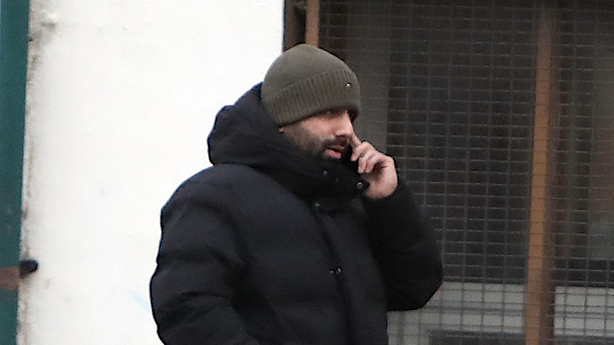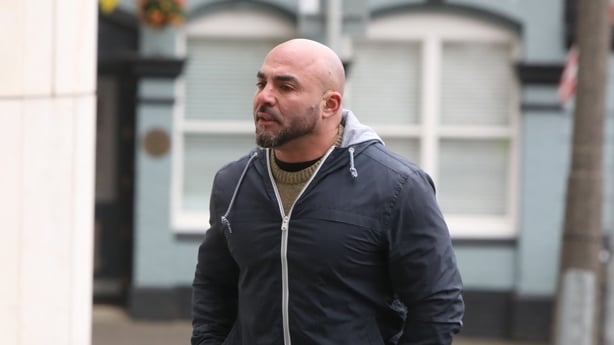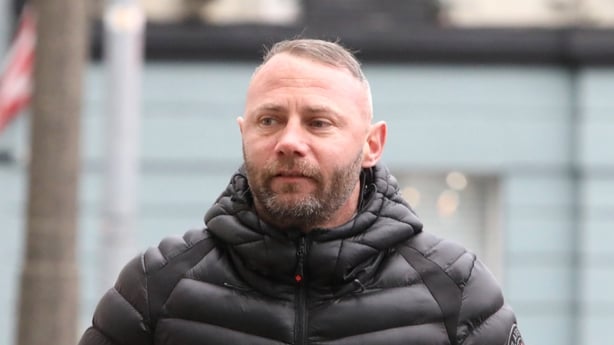Three men have been convicted on charges of rape and sexual assault of a woman they met in a Dublin nightclub in August 2019.
Anthony Hickey, 39, a personal trainer from Ballyogan Square, Carrickmines in Dublin, was found guilty of raping the woman at his then-home in Dundrum and of oral rape and sexual assault in a car.
Fabio Vicente, 42, of Little Newtown, Enniskerry, Co Wicklow, was convicted of raping the woman in a car and at the same house.
Matin Zolfaghari, 34, from Marley Court, Rathfarnham in Dublin, was found guilty of orally raping the woman at the same house.
He was found not guilty of sexually assaulting her in a car.
All three men had denied the charges and said that any sexual activity on the night was consensual.
After a two-and-a-half week trial at the Central Criminal Court, the jury reached its guilty verdicts by an 11-1 majority having deliberating for more than 13 hours.
The men have been remanded in custody and will be sentenced on 10 March when the judge will also hear victim impact evidence.
Things got 'hazy and faded' - complainant
The woman had been at the nightclub with a friend but had stayed behind after her friend went home and had engaged with the three men.
She said after her friend left things got "hazy and faded", adding that she believed she had been drugged.
The jury heard toxicology tests showed only alcohol and cocaine in her system and did not detect any so-called rape drugs.
The woman said she did not remember leaving the nightclub and her first recollection was sitting in the back of vehicle she thought was a taxi.
The car in fact belonged to one of the accused.
She remembered a man being on top of her and she could not move or talk and believed she was raped twice in the car but did not know if it was by the same person or one of the others.
She did not remember entering a house or how she got there, she said, but her next memory was lying horizontally at the end of a bed with two men in the room, one of whom was on top of her.
The woman said she passed out and later woke up with a man asleep beside her.
She said she was panicking and got dressed before leaving the house and ordering a taxi from the road.
She sent her housemate a pin drop of the location and when she got home she told her housemate she had been raped.
Zolfaghari made recordings for a 'laugh', court hears

The jury was told one of the men had taken videos in the car and the house.
During a 30-second clip taken in the car, a woman's voice could be heard a number of times saying: "No."
A WhatsApp exchange later showed one of the men sending the video and another saying: "Listen to you laughing after she says no."
Zolfaghari, who made the videos, told gardaí he recorded the videos as it was his "first time experiencing something like this".
He said he made the recordings for a "laugh" and later shared the videos in a group chat with the first accused and another male friend.
He said he sent them "for a laugh", describing it as a "locker room chat" between "blokes".
Gardaí put it to him that in the video "you were laughing at her being raped".
The man insisted the audio was of one of the men asking for anal sex, and while the woman refused, "she continued to have sex, she knew what she wanted to do".
He denied anyone used force and said it was "insanity to throw that at us", adding that he would never let that happen.
Men 'did not care whether she was consenting' - prosecuting counsel

In closing arguments, prosecuting counsel Karl Finnegan told the jury the complainant had hit the nail on the head when she said the three men seemed to be keeping an eye on her.
He said the CCTV footage from inside the nightclub showed people drinking and dancing and the three men seemed to be the soberest there.
He asked the jury to consider if they had been "ready for her as she got her coat to leave" and said there appeared to be very little conversation between her and the men as they left.
He asked the jury to consider why one of the men removed his shirt as he approached the car and why the woman was placed in the back of the vehicle if they were simply going to talk about going somewhere else to continue drinking.
Mr Finnegan said the three men had concocted a story about consent after their homes had been searched, but the most striking piece of evidence in the case was the WhatsApp messages in which one of the men said "send me that clip of your one" and the comment "listen to you laughing after she said no".
He said the messages demonstrated the attitude of the men to the woman and there was no mention of consent to being videoed during a sexual act with three men she had met only a half an hour beforehand.
"They did not care whether she was consenting to what they did," he said.
At the beginning of the trial, Mr Finnegan told the jury that toxicology reports showed the woman was highly intoxicated at the time and "what the case boils down to is consent".
He said a person does not consent if they are incapable because of the effect of alcohol or other drugs.
He also said if someone does not offer resistance this does not constitute consent.
All three men claimed any sexual contact they had with the woman was consensual.
Complainant's memory 'seriously unreliable' - defence

Padraig Dwyer, defence counsel for Hickey, told the jury he was not suggesting the complainant was malicious or deliberating telling lies.
But he said her evidence was given in the context of a memory black out while drinking and added: "Just because you have forgotten what you were doing it does not mean you are incapable of making decisions, it just means the record button was not pressed down."
He said that "the mere fact that a person is drunk when they make a decision does not mean they are incapable of making that decision".
Mr Dwyer said there were large gaps in the complainant's memory and it was "seriously unreliable and inaccurate".
He said she had described her interaction with the three men as just "silly chat" on the night but when shown the CCTV footage she could be seen dancing "extremely energetically" in a "highly sexualised" way.
"If they didn't have their clothing on you could say they were virtually having sex," he said.
Mr Dwyer said the woman was absolutely entitled to do that but it was contrary to what she had said in her evidence as it showed she was a free agent in the club and had approached the men herself a number of times rather than being controlled by them as had been suggested.
He said the suggestion that she had been lured to the car was simply not the case.
Mr Dwyer said the footage also showed she had complete control over her phone at all times and could have called for help.
This was not the actions of three alleged predators, he said.
We need your consent to load this rte-player contentWe use rte-player to manage extra content that can set cookies on your device and collect data about your activity. Please review their details and accept them to load the content.Manage Preferences
Danger of 'dialling up the emotional temperature' - defence
Mr Dwyer said he was not saying his client acted like the perfect gentleman on the night and the jury "might feel some revulsion".
"I accept it is out of the norm for a woman to have sex with more than one partner... but you know there are people who engage in sex with multiple partners and there are swingers out there. The fact that you engage in that and regret it or loathe yourself for it does not mean it was non-consensual, it just means it is something you did and regretted," he said, adding that his client "firmly and stridently" denied the allegations against him.
Gareth Baker defending Vicente told the jury there was a danger of "dialling up the emotional temperature" in the case when the prosecution mentioned vulgarity and revulsion.
He told the jury they were evaluators, not investigators and they ran the risk of inventing evidence to fill the gaps and irregularities in the prosecution's case.
He said he was not there to condemn or attack the complainant but there had to be recognition of the fact that the evidence did not go far enough in the context of a criminal case and they must not feel "guilted" into finding ways to convict.
The complainant had said she believed her drink was spiked and her memory and body had failed her, he said.
He said the CCTV footage from the club was very important as it showed her only minutes before, dancing in an energised way, "she is nimble it shows agility, its physical, it reveals a dexterity, a dynamism and a deftness and shows coordination and control," he said.
Mr Baker said at the centre of the case was a woman with "serious memory deficiencies" which could only hinder the prosecution's case. He said the jury should listen repeatedly to the video clips and in particular the use of the word "no", which he said had to be put in context as there was a suggestion of anal sex and the accused said this is what she was saying 'no' to.
He urged the jury to listen repeatedly to the second video clip taken in the house and said the breathing sounds were suggestive of consensual sex.
He said the jury had to be satisfied that a person accused of rape knew that the person was not consenting or was reckless as to whether or not there was a risk they were not consenting or were incapable of giving consent.
He said the prosecution case was not robust enough, not compelling enough and of insufficient evidential quality.
Zolfaghari a bystander - defence counsel
Defence counsel Seamus Clarke for Zolfaghari said his client was very much a bystander in the case.
He said his client had admitted kissing the woman in the car and that saliva found on her underwear could have arisen from cross contamination or transfer and did not establish that he had sexually assaulted her.
He said his client was the receiver of oral sex from the woman while they were at the house and honestly believed this was consensual.
Mr Clarke said it was "not illegal to have oral sex with someone whose judgement is impaired by alcohol or to have sex with someone and later regret their actions because they would not have done it while sober".
The defence was readily prepared to accept the woman was intoxicated but not so intoxicated that she was incapable of consenting, he said.
He said it was completely understandable that "if you have a memory blank you create a narrative that tells you something happened, but it could be completely wrong".
The videos taken by his client were distasteful and sordid and did him no favours, but he said "this is a court of law, not a court of morals".
The reality was that young and not so young men can be crude in WhatsApp groups, he added.
Mr Clarke said the correct question was could it be reasonable that his client believed the woman was consenting... "could he have had an honest but mistaken belief she was engaging in consensual activity at the house?".
What the jury didn't hear:
In the absence of the jury, the prosecution sought to introduce a series of WhatsApp messages recovered from Vicente's phone.
This phone was seized after he suggested in garda interviews that there was a third video, but no other recordings were found.
The court heard that Hickey had messaged Vicente with an account of the night in question on 16 January 2020.
This was not read to the court, but was described during legal argument as a collective account.
Hickey then wrote "read and see what you think", then later asked if an email had been sent.
A screenshot of this account was also sent by Zolfaghari to Vicente on a later date.
In a message dated 30 July 2020, Hickey forwarded an article to Vicente about the quashing of a rape conviction saying "read this" and "can you talk".
On 8 September 2020 - two days before their garda interviews - Hickey messaged Vicente with the account, asking him to read it. Hickey said he had been going over it "to stay sharp" and that they should "meet tomorrow before we go to war" .
The defence initially sought to exclude these messages on the grounds of relevance and potential prejudice. It was later argued that the account of the night was legally privileged as it arose from legal advice provided to the men by their solicitor.
An email of this account sent by Vicente on 17 January 2020 to their solicitor was handed into the court.
The men’s solicitor told the court he recalled holding a preliminary consultation in December 2019 during which he suggested they "should individually work on their memory" and if necessary, to speak with each other about that night to refresh their memories.
Karl Finnegan SC, prosecuting, argued that this case is "about the credibility of witnesses" and the exclusion of these messages would leave the jury without "very relevant evidence" when they are considering the reliability of the men’s accounts.
No ruling was made by Mr Justice Paul Burns as an agreement was reached by the parties.
Instead, the jury heard that the men messaged each other before their garda interviews, arranging to meet.
Additional reporting Eimear Dodd







